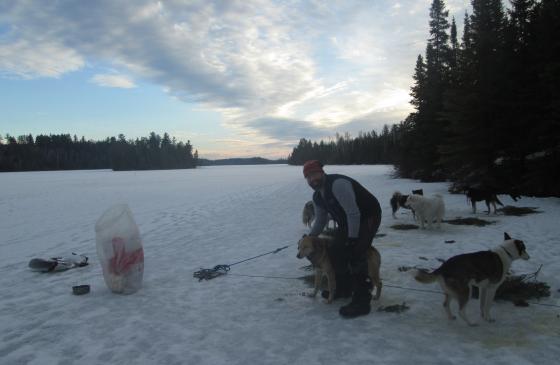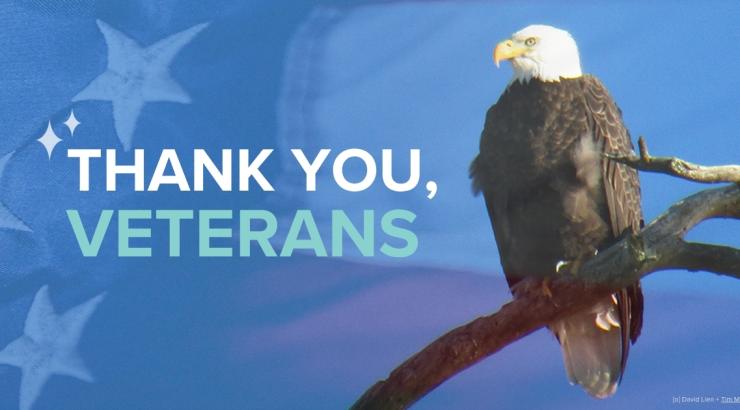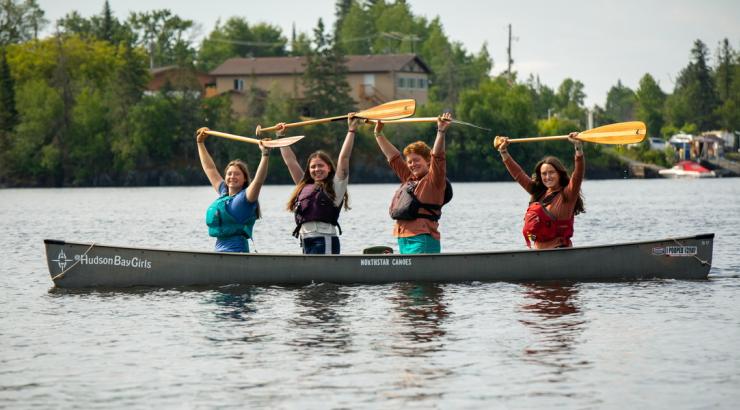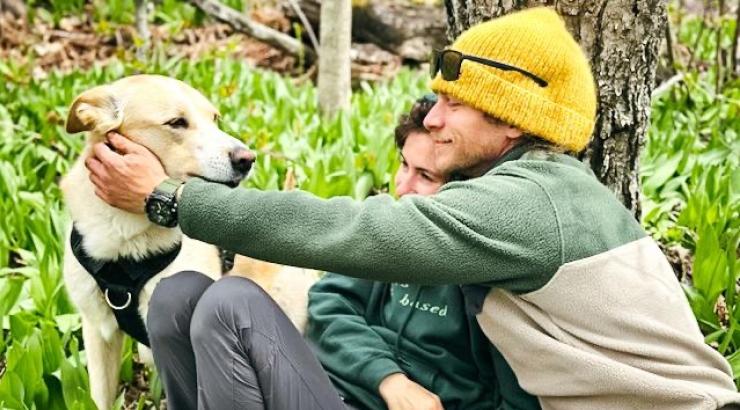 Two years ago I went on a life changing expedition that gave me life again. It was an eight-day dogsled and cross-country ski expedition with Voyagers Outward Bound School (VOBS) veterans program in the Boundary Waters. This expedition sent me on a new path that made me want to engage with life again. At the end of the expedition, I realized that I was capable of so much more than what I had previously thought, and that I was not just damaged goods. After the trip, we learned about the dangers facing the Boundary Waters from proposed mines in its watershed. I could not stand by. To share my story and connect with other veterans who have similar stories, I founded Veterans for the Boundary Waters, partnering with the Campaign to Save the Boundary Waters and Sportsmen for the Boundary Waters. I did this with hopes of showing what would be lost should the sulfide-ore copper mines be allowed to proceed. Throughout the two years as I shared my story, I wondered if I would ever go back to the Boundary Waters during the winter. There is something truly special about winter in the Boundary Waters. It gives you the space to look deep into parts of you that have been neglected or dormant. I really wanted to go back and see what I would learn about myself when I was not battling my own mind. That is when I was offered another chance to go on a VOBS veterans winter expedition. I was going on an adventure!
Two years ago I went on a life changing expedition that gave me life again. It was an eight-day dogsled and cross-country ski expedition with Voyagers Outward Bound School (VOBS) veterans program in the Boundary Waters. This expedition sent me on a new path that made me want to engage with life again. At the end of the expedition, I realized that I was capable of so much more than what I had previously thought, and that I was not just damaged goods. After the trip, we learned about the dangers facing the Boundary Waters from proposed mines in its watershed. I could not stand by. To share my story and connect with other veterans who have similar stories, I founded Veterans for the Boundary Waters, partnering with the Campaign to Save the Boundary Waters and Sportsmen for the Boundary Waters. I did this with hopes of showing what would be lost should the sulfide-ore copper mines be allowed to proceed. Throughout the two years as I shared my story, I wondered if I would ever go back to the Boundary Waters during the winter. There is something truly special about winter in the Boundary Waters. It gives you the space to look deep into parts of you that have been neglected or dormant. I really wanted to go back and see what I would learn about myself when I was not battling my own mind. That is when I was offered another chance to go on a VOBS veterans winter expedition. I was going on an adventure!
When I arrived at VOBS, Bud, the director of winter expeditions, told us that for the first time ever VOBS would be combining a Veterans course with an adult course. I met the only other veteran that would be on the trip--Doug Kelley, a Special Forces Officer who severed in Vietnam. Kelley, I would later find out, is the kind of guy that Chuck Norris would have a poster of on his wall. I wasn’t sure how this was going to work. So many opposites would have to work together in harsh conditions on one of the hardest courses that VOBS has to offer. The divides we would have to overcome included generational--we spanned the baby boomers, Generation X and millennials. I couldn’t see an overarching connection that would unite us all. My failure was I did not realize the experience itself would unite us.
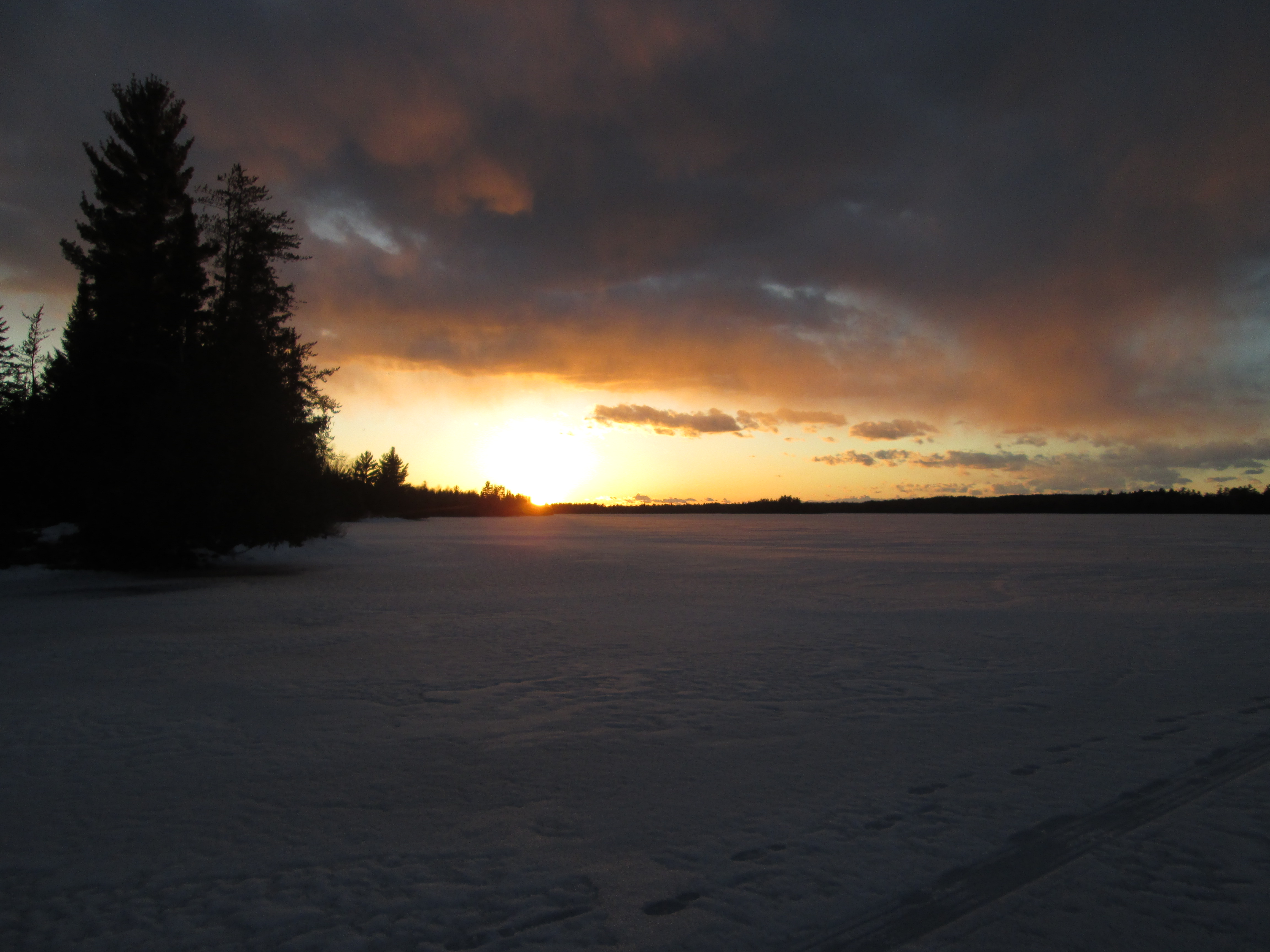 Once we had gathered, the expedition started out the same as all of them do: classes on what to wear, how to solve gear issues, how to sleep on ice in the winter and how to set up our tents. We spent the first night on the ice in front of VOBS to help acclimate us to the cold. Before we climbed into our sleeping bags, we did some cross-country skiing on the lake to warm up. There was a moment that night when everyone shut off his or her head lamp and just looked at the stars. Those who had never been to the Boundary Waters before could not believe all of the stars that were out. While standing there in the quiet with nothing but the stars, I realized it was the first time that we felt connected as a group. The Boundary Waters has way of doing that, just a few quiet moments when you stop and look to see all that is around you. The beauty and stillness connects you to something greater than yourself something--it's intangible. In this moment, I could see the connection start in those that had never been there before.
Once we had gathered, the expedition started out the same as all of them do: classes on what to wear, how to solve gear issues, how to sleep on ice in the winter and how to set up our tents. We spent the first night on the ice in front of VOBS to help acclimate us to the cold. Before we climbed into our sleeping bags, we did some cross-country skiing on the lake to warm up. There was a moment that night when everyone shut off his or her head lamp and just looked at the stars. Those who had never been to the Boundary Waters before could not believe all of the stars that were out. While standing there in the quiet with nothing but the stars, I realized it was the first time that we felt connected as a group. The Boundary Waters has way of doing that, just a few quiet moments when you stop and look to see all that is around you. The beauty and stillness connects you to something greater than yourself something--it's intangible. In this moment, I could see the connection start in those that had never been there before.
The next morning, we packed our sleds and headed to the entry point. There is always a nervous tension in the air as you are about to embark from the entry point into the Boundary Waters. It is the excitement of what is to come, mixed with the fear of the unknown that comes in the phrase, “I guess we are really doing this!” For those who have never been on ice before, the question is always, “Is it really safe to step out on the ice?” Then comes the most terrifying step--the first one. We all took it and stepped out on to the ice. Despite all of our differences, we were going to live and work together in the wilderness for seven days. To be honest, I was not sure how it was going to work.
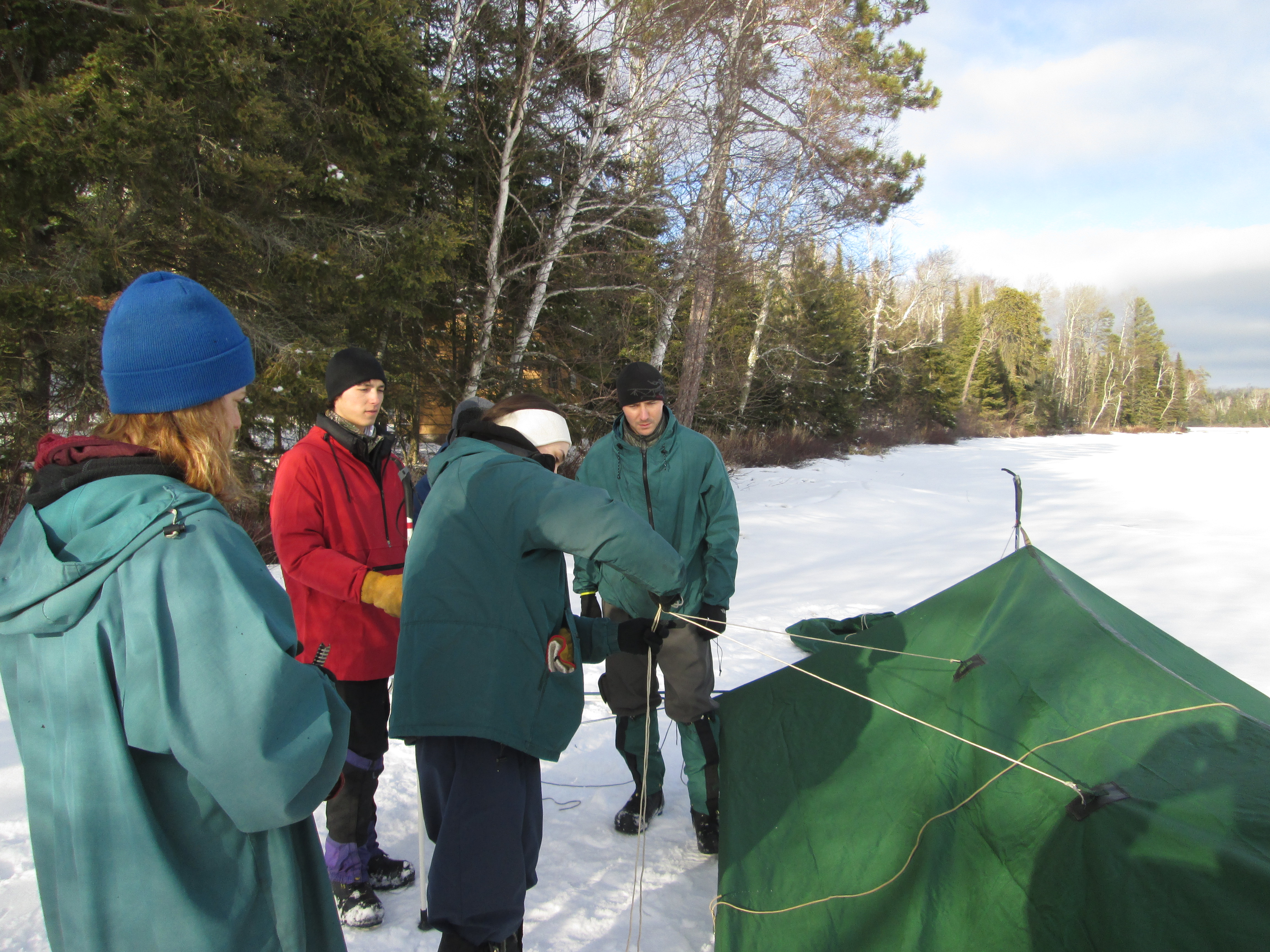
It did work. With each passing mile, task and night, it became clear that despite our differences we could relate to one another. As we gathered around a campfire each night to share our thoughts on the day, it was easy to find ways to relate to those we thought we had nothing in common. One night there was a conversation about how to train for a marathon, and several in the group wanted to run one. One of our instructors turned to Kelley and asked if he had ever run a marathon. Kelley replied, “I have run about 28 marathons; they are good training for hard climbs I have done, like Everest or El Capitan.” Everyone's jaw dropped and that was when the younger members realized they had a lot to learn from him. Although, it was not all smooth sailing. During the coldest day with the highest winds, the dogs were not cooperating. There was also tension over who would be chopping the rest of the firewood. However, the instructors’ guidance and an excellent meal eased all the tension.
The real breakthrough came the morning after solo. Solo is our chance to go out to our own campsite with the skills we have learned and put them to the test. It is also a time for us to reflect. We reflect on where we are going in life, what we have done and whatever else we would like to reflect on. It was during solo night on my last trip with VOBS when I found peace--a peace that never made me think again that taking my own life was a solution. During my solo on this trip, I thought about how far I had come from that first solo, and I thought about the Wilderness that I was now trying to protect. The Boundary Waters in winter is far quieter than in summer. The only real sound is that of the wind. It's not like any park or recreational site you may find elsewhere. It’s a true Wilderness that gives you space from modern life to truly reflect and look deep into yourself. This is why so many who do solos or have been to the Boundary Waters come out different and more in-tune with what is important to them. The next morning I decided that I would share my story with the group: how I came to this point in my life and why I am now better. After I shared my story, the others shared their stories. Even though we all had very different backgrounds and very different life experiences, we related to each other. It was a moment that I do not think could happen under any other circumstances.
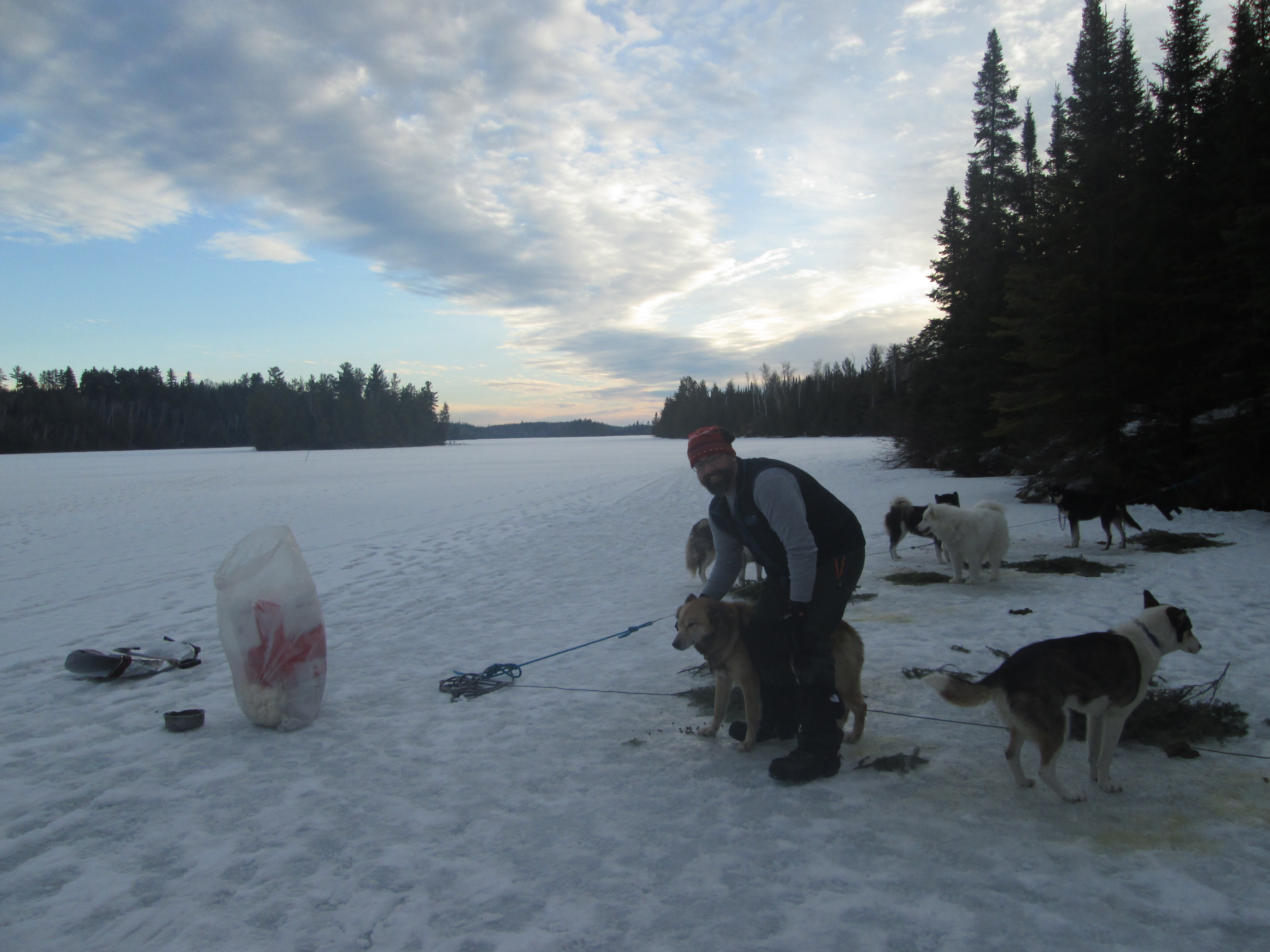 After that morning, we had one more day of travel. During our final fire conversation, even those who did not talk much before were having great conversations about the trip and their future plans. Kelley shared which schools taught mountaineering, the first time campers planned their next camping adventures, and I reflected on how far we had come. In terms of distance, we had only done about 27 miles. In terms of coming together to have a successful expedition, we had come so much further. The way the VOBS ran the program combined with the Boundary Waters itself allowed us to bridge gaps that many in our society may think impossible. In one week, all of the generational labels were swept away and we worked together as a group. At the final graduation ceremony, Kelley summed up the the feeling of the expedition the best. He said, before the expedition he was worried by what had been going on in our country, but after working with the 18-year-olds on this trip--he thought America would be just fine!
After that morning, we had one more day of travel. During our final fire conversation, even those who did not talk much before were having great conversations about the trip and their future plans. Kelley shared which schools taught mountaineering, the first time campers planned their next camping adventures, and I reflected on how far we had come. In terms of distance, we had only done about 27 miles. In terms of coming together to have a successful expedition, we had come so much further. The way the VOBS ran the program combined with the Boundary Waters itself allowed us to bridge gaps that many in our society may think impossible. In one week, all of the generational labels were swept away and we worked together as a group. At the final graduation ceremony, Kelley summed up the the feeling of the expedition the best. He said, before the expedition he was worried by what had been going on in our country, but after working with the 18-year-olds on this trip--he thought America would be just fine!
I always knew that the Boundary Waters was very special, but what I learned on this expedition is that the human potential that surfaces from a trip like this is far more valuable than any mineral that can be ripped out of the earth.
--> Read about their trip in the Timberjay or listen to Erik's reflections on WTIP Radio.
Erik Packard is the founder of Veterans for the Boundary Waters. He has been going to the Boundary Waters his whole life, with his family first taking him as an infant. In 1996, at the age of 17 years old, he joined the United States Army. Packard served in the United States Army Reserve for 14 years and served two combat tours in Iraq. After his last tour in Iraq, he began suffering from post-traumatic stress disorder and depression. After many treatments, he discovered Voyageurs Outward Bound School's program for veterans. After his trip with VOBS, Packard began fighting to protect the Boundary Waters from proposed sulfide-ore copper mining and has been sharing his story to help protect this Wilderness.
